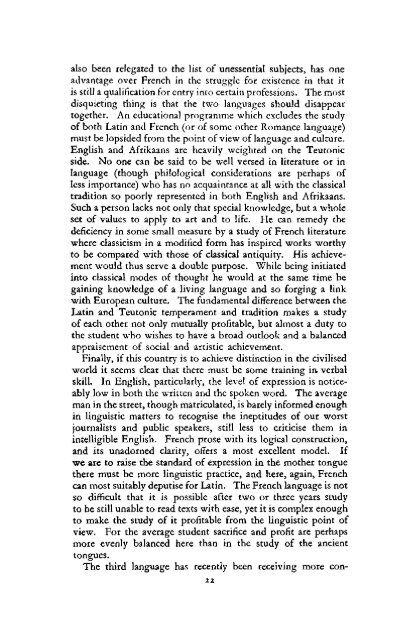Theoria - DISA
Theoria - DISA
Theoria - DISA
Create successful ePaper yourself
Turn your PDF publications into a flip-book with our unique Google optimized e-Paper software.
also been relegated to the list of unessential subjects, has one<br />
advantage over French in the struggle for existence in that it<br />
is still a qualification for entry into certain professions. The most<br />
disquieting thing is that the two languages should disappear<br />
together. An educational programme which excludes the study<br />
of both Latin and French (or of some other Romance language)<br />
must be lopsided from the point of view of language and culture.<br />
English and Afrikaans are heavily weighted on the Teutonic<br />
side. No one can be said to be well versed in literature or in<br />
language (though philological considerations are perhaps of<br />
less importance) who has no acquaintance at all with the classical<br />
tradition so poorly represented in both English and Afrikaans.<br />
Such a person lacks not only that special knowledge, but a whole<br />
set of values to apply to art and to life. He can remedy the<br />
deficiency in some small measure by a study of French literature<br />
where classicism in a modified form has inspired works worthy<br />
to be compared with those of classical antiquity. His achievement<br />
would thus serve a double purpose. While being initiated<br />
into classical modes of thought he would at the same time be<br />
gaining knowledge of a living language and so forging a link<br />
with European culture. The fundamental difference between the<br />
Latin and Teutonic temperament and tradition makes a study<br />
of each other not only mutually profitable, but almost a duty to<br />
the student who wishes to have a broad outlook and a balanced<br />
appraisement of social and artistic achievement.<br />
Finally, if this country is to achieve distinction in the civilised<br />
world it seems clear that there must be some training in verbal<br />
skill. In English, particularly, the level of expression is noticeably<br />
low in both the written and the spoken word. The average<br />
man in the street, though matriculated, is barely informed enough<br />
in linguistic matters to recognise the ineptitudes of our worst<br />
journalists and public speakers, still less to criticise them in<br />
intelligible English. French prose with its logical construction,<br />
and its unadorned clarity, offers a most excellent model. If<br />
we are to raise the standard of expression in the mother tongue<br />
there must be more linguistic practice, and here, again, French<br />
can most suitably deputise for Latin. The French language is not<br />
so difficult that it is possible after two or three years study<br />
to be still unable to read texts with ease, yet it is complex enough<br />
to make the study of it profitable from the linguistic point of<br />
view. For the average student sacrifice and profit are perhaps<br />
more evenly balanced here than in the study of the ancient<br />
tongues.<br />
The third language has recently been receiving more con-<br />
22
















